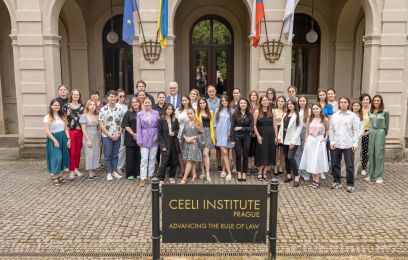
When six Western allies and the EU announced plans in February to target the assets of Russian oligarchs in a bid to sway support for the Kremlin’s invasion of Ukraine, mechanisms for how forfeitures would be conducted were barely discussed. For Ukraine’s legal system, that presented a problem.
Unlike many of its allies, including the United Kingdom and the United States, Ukraine has limited experience in implementing sanctions on its own soil, or in issuing sanctions orders against citizens for other countries to implement. Ensuring that actions taken against property owners are not challenged in court, or even reversed, is a top priority for the country’s legal experts.
In many ways, the future of Ukraine depends on getting this right.
Ukraine will need billions of dollars to rebuild once the fighting is over, and many legal scholars view seized assets as a source of redevelopment funding. But a dearth of case law on how to freeze and seize assets is complicating Ukraine’s forfeiture efforts.
In November, Ukrainian and International legal scholars, judges, lawmakers, and prosecutors gathered in Prague at the CEELI Institute to discuss how to proceed. The event, Non-Conviction Based Forfeiture of Assets of Persons Under Sanctions, was the first time since the war began that experts from Ukraine’s Ministry of Justice, the High Anti-Corruption Court, and the Supreme Court were together to sort through these issues.
“Having all sides of the Ukrainian legal system together to transparently lay out our problems, and to discuss solutions, was essential,” said Kateryna Shyroka, a judge at the High Anti-Corruption Court of Ukraine.
“If we want to be a truly democratic country with the rule of law, we must think about these developments. If we don’t, we’re no better than the Russians.”
Non-conviction based civil forfeiture is a relatively new legal phenomenon, and only began in the U.S. in the 1980s as a tool to fight the war on drugs. In Ukraine, only a handful of cases have been filed since the war began, with no assets seized.
Ukraine’s Parliament has taken steps to strengthen its forfeiture regime. Lawmakers have changed the country’s laws to facilitate forfeiture of assets in Ukraine, and made subsequent amendments. And yet, legal experts say numerous details still need to be fleshed out – such as which courts have jurisdiction, how quickly cases must be filed, and what constitutes proof of ownership.
Another challenge is that subjects of forfeiture can appeal to European courts citing EU law protecting due process and property rights. To date, more than 60 Russian oligarchs have filed cases with the European Court of Justice, claiming their rights have been violated.
“If something is confiscated outside of a legal regime, it will almost always be considered a violation of the European Convention on Human Rights,” said Kanstantsin Dzehtsiarou, a professor of human rights law at the University of Liverpool. That holds true even for Russian oligarchs, he added.
A new Ukrainian law allows the state to confiscate assets of people who support Russia’s aggression. But the reach of that law ends at Ukraine’s borders, because other countries have no legal basis for seizing property based solely on support for a war.
“If what you are trying to achieve is the confiscation of assets outside of Ukraine, the first question should be legislative; does your country have a legal regime that other countries will enforce?” David O’Mahony, a barrister at London’s 7BR, said during the training.
“The second is practical. If you have a case against an individual and you know they have assets somewhere else, it’s a good idea to be in touch with that state to frame a case that is likely to be enforced.”
During discussions, legal experts stressed that in most jurisdictions, sanctions evasion and making false statements to financial institutions are crimes that can more easily be prosecuted than other sanctions-related crimes. Those are not crimes in Ukraine, however, hampering it from requesting confiscation of assets in other jurisdictions.
Yaroslav Yurchyshyn, a member of Ukraine’s parliament, said that because of the workshop, new legislation has been drafted by the Anti-Corruption Policy Committee to criminalize sanctions avoidance. That legislation is currently under review.
Getting these laws right will be essential to how the post-war period proceeds. “When the war is over, vast sums will be required to rebuild Ukraine, and in many people’s view money seized through sanctions will be a key source of reconstruction funding,” said CEELI Institute Executive Director Julia Fromholz.
“But if other countries doubt the legal support and due process in the Ukrainian legal system, then they’re less likely to enforce Ukraine’s sanctions orders,” Fromholz said. “Ensuring the rule of law is essential to Ukraine’s present, and to its future.”
Halyna Senyk, a CEELI Institute senior program advisor, added: “Just like the war itself, the legal landscape in Ukraine is constantly changing. We’re here to help Ukrainians respond to issues in ways that are in line with the rule of law.”


